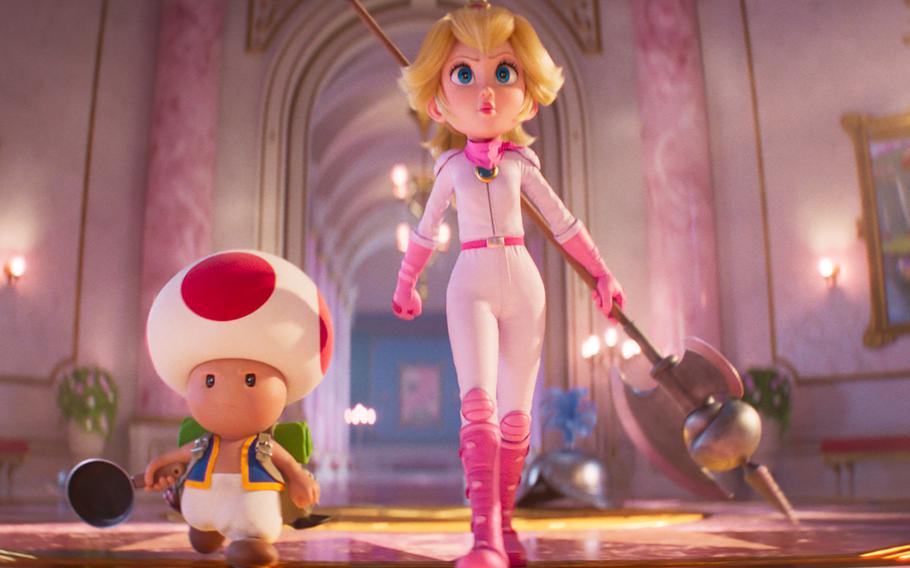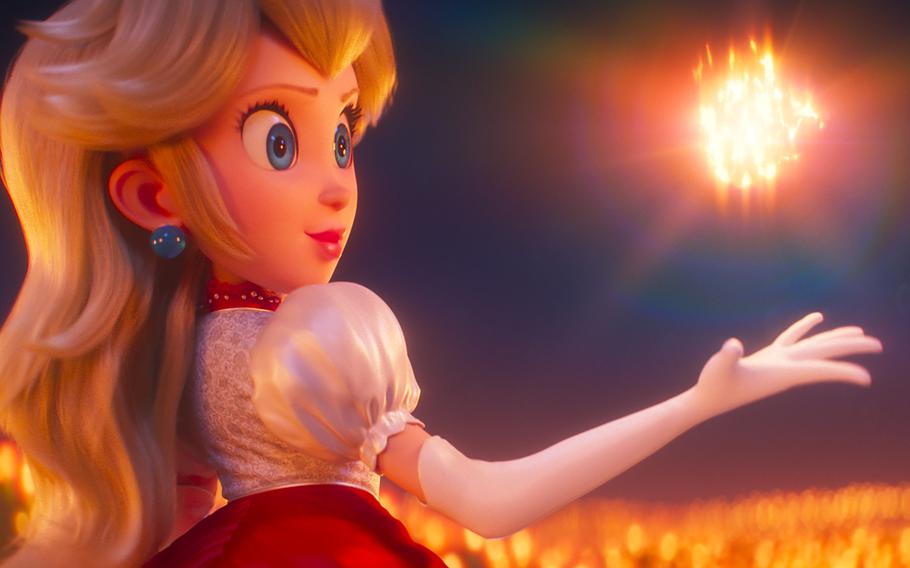
Toad (Keegan-Michael Key) and Princess Peach (Anya Taylor-Joy) in “The Super Mario Bros. Movie.” In the new film, Peach is not just a monarch, she’s also secretary of state and secretary of defense. The film begins with her traveling to Donkey Kong’s kingdom in an attempt to form a military coalition. (Nintendo/Illumination Entertainment & Universal Pictures)
In the just-released "Super Mario Bros. Movie," Anya Taylor-Joy's Princess Peach is such a competent, fearless leader and warrior, Mario feels like a supporting character. But throughout the 38-year history of the Mario franchise, the princess has often transcended the classic damsel-in-distress role, and the movie's portrayal is just another example.
This may shock anyone who hasn't paid attention to the dozens of Super Mario games over the years, particularly since Princess Peach has been the enduring damsel-in-distress archetype not just on screen but in most modern fiction. She mirrors Dulcinea del Toboso, the ill-defined princess who seemingly exists only within the mind of classic Spanish hero Don Quixote. But unlike Quixote's misguided definition of chivalry needing a "lady," Peach has long demonstrated she needs no man.
Already, right-wing commentators and outrage bait influencers such as Sneako are calling this portrayal "feminist propaganda," but they ignore facts and history. Peach is the most visible woman in video games, having appeared in more titles than any fictional woman in the medium.
Throughout that prolific history, she's often kidnapped by the villainous Bowser, king of the rival Koopa Kingdom to Peach's Mushroom Kingdom, and needs rescuing from Mario, a working-class, blue-collar plumber reimagined as a knight in shining armor for the industrial age. In the first two decades of Mario, Peach would sometimes be written into roles relying on ancient gender norms, like baking cakes and being portrayed as overly emotional. But more often, she's portrayed as a woman with power and agency. Mario creator Shigeru Miyamoto says Peach was always meant to be powerful, and the new film offers us the most confident and assertive version yet.
Her journey to independence began with “Super Mario Bros. 2” in 1988, where Peach became one of the few playable female characters in video games. She was imbued with the power to float over enemies and dangerous obstacles, much like she does in the new film.
The road was rocky at times, evidenced in the 1989 TV show "The Super Mario Bros. Super Show!" in which she reverts back to the distressed-damsel role, finding herself kidnapped alongside her royal guardian Toad in several episodes. She's also cast as a Mother Teresa-like figure, tending to orphanages. While active in her charitable efforts, overall she's a very passive character.
But just three years later, Nintendo's magazine Nintendo Power published a series of Mario comics created in the manga style by Charlie Nozawa and Kentaro Takekuma. Its depiction of Peach was radical at the time, showing her not only successfully evading capture but also leading an assault on her enemies, even resorting to holding them hostage with bomb threats. She's portrayed as capable in close-quarters combat, a levelheaded wartime mediator and a master of disguise. Taylor-Joy's character echoes this version, since the movie begins with Peach traveling to Donkey Kong's kingdom in an attempt to form a military coalition.
She's not just a monarch, she's also secretary of state and secretary of defense.

Anya Taylor-Joy, who plays Princess Peach in the “The Super Mario Bros. Movie,” says, “Peach is an empowered woman. If you think about the storyline, it makes more sense that she’s strong and in control, because she is the ruler of the Mushroom Kingdom. ... So if she was constantly being plucked out of her castle, she wouldn’t be very good at ruling, would she?” (Nintendo/Illumination Entertainment & Universal Pictures)
The new film's Peach was intentional from inception, Taylor-Joy told GamesRadar in a podcast interview. Peach would be a role model for what female leadership can look like, something they planned "from the very first meeting," she said.
"Peach is an empowered woman," she added. "If you think about the storyline, it makes more sense that she's strong and in control, because she is the ruler of the Mushroom Kingdom. ... So if she was constantly being plucked out of her castle, she wouldn't be very good at ruling, would she?"
Princess Peach is also the most prolific female video game character in existence, having appeared in about 60 Mario games, playable in 40. She finally got to star in her own in 2005 with "Super Princess Peach" for the handheld console Nintendo DS. However, this came with some problematic caveats: Her powers were entirely based on her emotions, a clear reflection of the stereotype that women's behaviors are not driven by logic. In the game, she had an "emotion meter" to reflect her four emotional powers of calm, joy, gloom and rage. It felt like one step forward and two steps back.
The most recent attempt to correct that misstep occurred in the last big Mario game, 2017's "Super Mario Odyssey" for the Nintendo Switch. Sure, she still functions as a damsel in distress, being forced into a wedding with that immutable Mario nemesis Bowser. But at the end of the game, Mario asks for her hand in marriage, Bowser makes a last-ditch attempt, and both of them seemingly threaten to drown Peach with flower offerings to her. She says enough is enough and rejects both suitors. The game ends with the two enemies comforting each other, while Peach flies off to go on a much-deserved vacation across the kingdoms.
Rehabilitating Princess Peach away from age-old gender norms of baking, being ruled by emotions and asking men for help has been a long process. Chris Suellentrop, the former New York Times video game critic (and now politics editor for opinions for The Washington Post), called out the stagnant gender prison Peach was in for Nintendo's mobile game "Super Mario Run," where she was once again relegated to baking and needing rescue.
"Representation in interactive media may be even more important than it is in linear entertainment," he wrote. "In video games, players describe ourselves as the digital avatars we control on a screen. We say 'I died,' not 'he died.'"
Maybe with the movie, the image of Princess Peach can finally transform in the public consciousness. No longer an imaginary stand-in requirement for chivalrous deeds, this princess can truly become master of her domain.